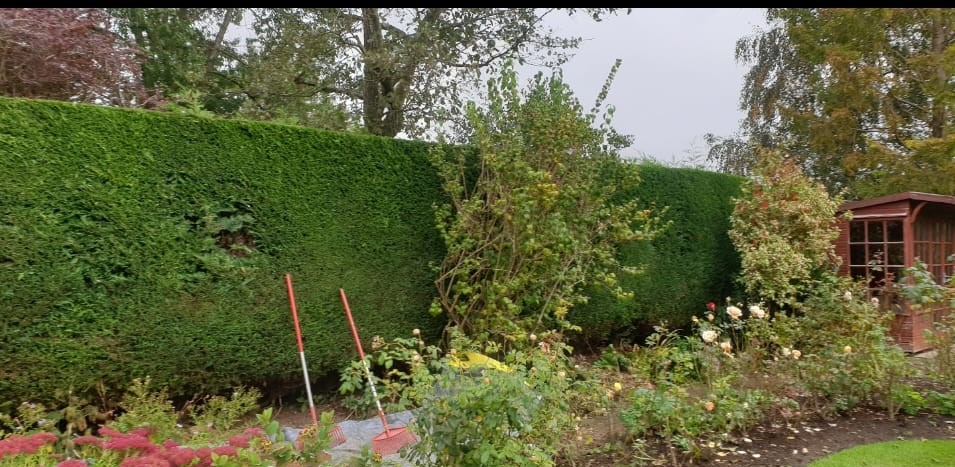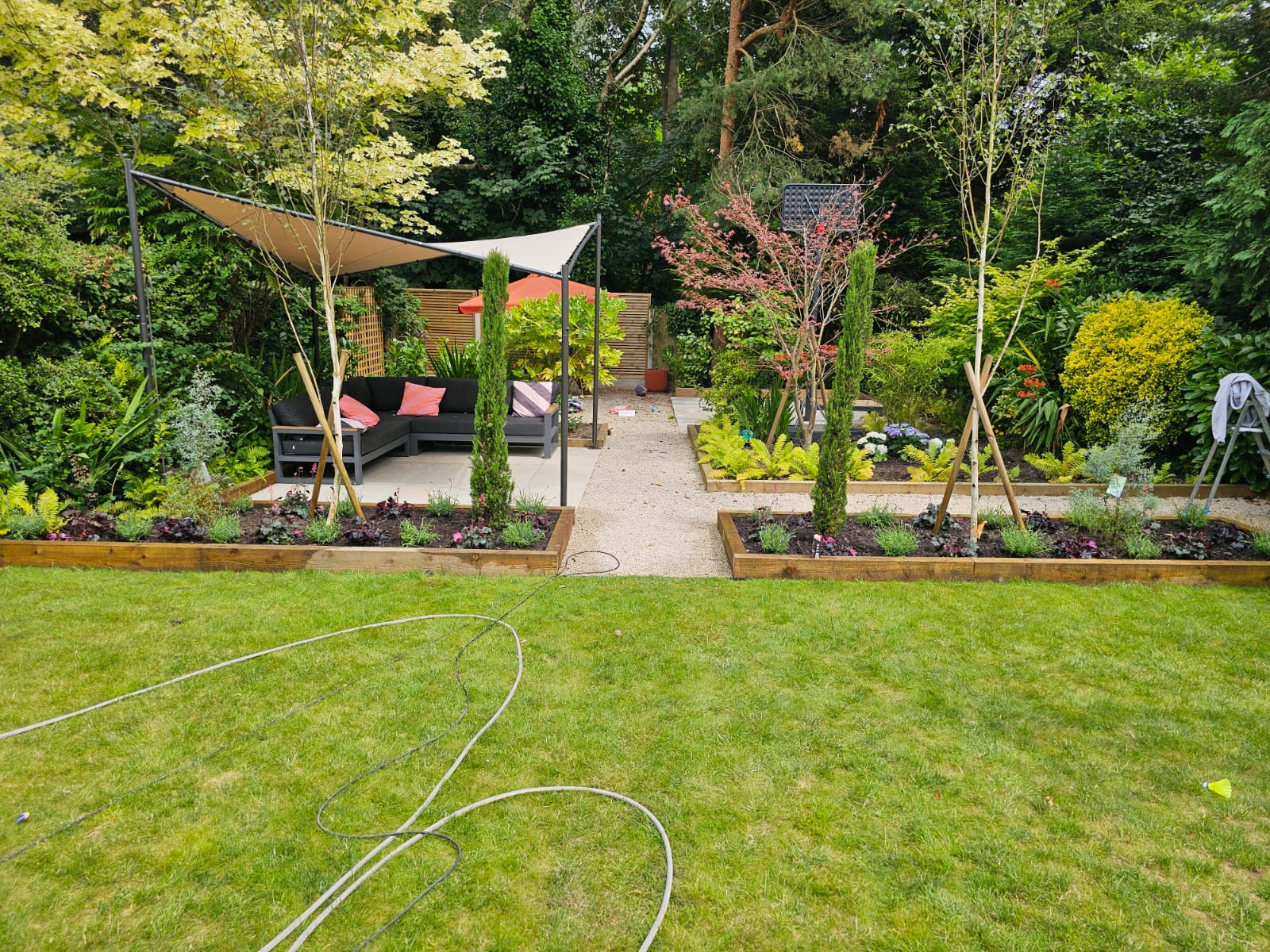Groundwork
Creating Stunning Outdoor Spaces in Cheshire and Trafford
Creating a beautiful and functional garden begins with solid groundwork. Whether you’re planning to create borders, plant flowers, or completely landscape your garden, proper preparation is essential. Here are some of the steps you need to follow when carrying out groundwork in a garden, from planning and preparation to planting and maintenance. But it can be hard work and you should consider finding landscape gardeners in Cheshire, like Master Landscapes. Getting affordable landscaping services and high-quality work could be a huge help – from the planning and design to the tough groundwork. Whether you live in Altrincham, Sale, Hale, Stretford, or any other town in the Cheshire and Trafford areas, this guide will help you transform your outdoor space into a spectacular garden.
Landscaping Your Garden to Look Its Best
Landscaping is about more than just planting flowers; it’s about creating a cohesive design that enhances the beauty and functionality of your garden. Whether you’re in Handforth or Rudheath, here are some key considerations for landscaping your garden.
1. Designing with a Purpose
Think about how you want to use your garden. Do you want a space for entertaining in Wilmslow or a quiet retreat in Prestbury? Consider adding features like a patio, deck, or water feature to enhance your garden’s functionality. In Tarvin or Winsford, you might also want to include pathways or seating areas.
2. Creating Focal Points
A well-designed garden should have focal points that draw the eye and add interest. This could be a sculpture, a large tree, or a flower bed in Hale Barns or Stretford. Position your focal points strategically to guide the flow of movement through the garden.
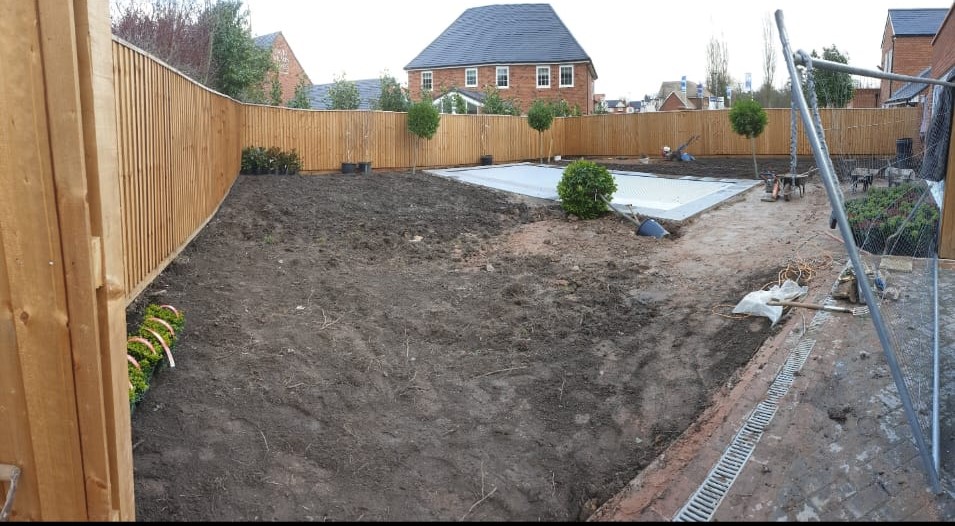
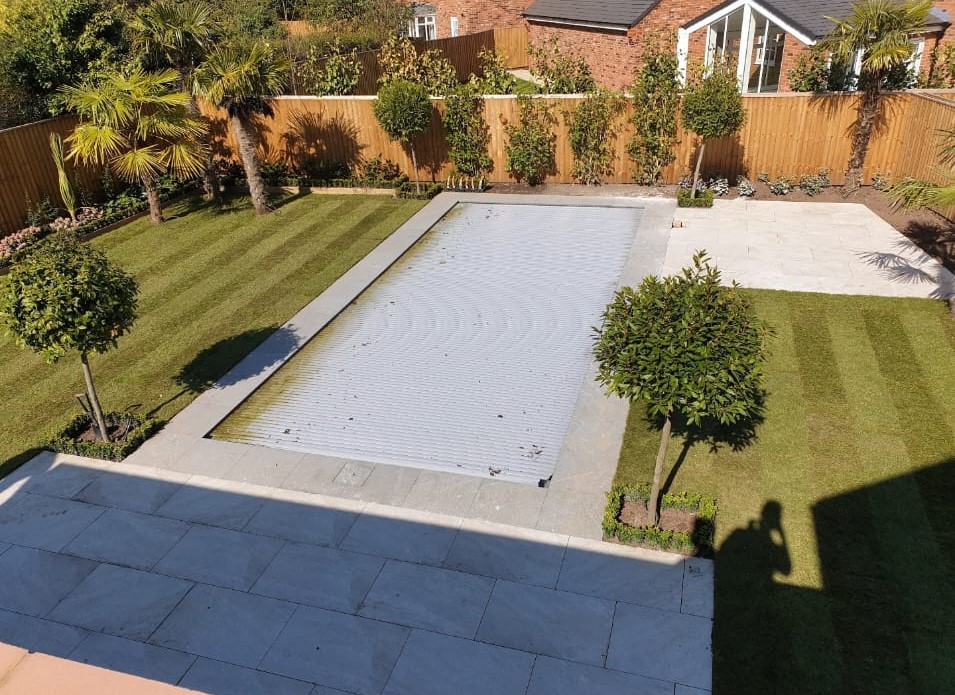
3. Choosing Plants Wisely
The plants you choose will largely determine the look and feel of your garden. In Nantwich or Northwich, consider the local climate and soil conditions when selecting plants. Opt for native species that are well-adapted to your area, as these will require less maintenance and be more resilient.
4. Incorporating Different Textures and Heights
Variety is key to a visually appealing garden. In Lymm or Holmes Chapel, mix plants of different textures and heights to create depth and interest. For example, pair tall ornamental grasses with low-growing ground covers, or combine leafy shrubs with delicate flowers.
What is Groundwork in Gardening?
Groundwork refers to the initial preparation of the soil and landscape in your garden. It involves everything from clearing debris and levelling the ground to installing drainage and preparing the soil for planting. Proper groundwork ensures that your garden is not only beautiful but also functional and sustainable. For residents in Knutsford, Wilmslow, Stockport, and surrounding areas, investing in quality groundwork can significantly enhance the value and appeal of your property.
How to Create Borders in Your Garden
Creating borders is a key aspect of garden design and groundwork. Borders help define different areas of your garden, providing structure and visual interest. Whether you’re in Macclesfield or Nantwich, well-designed borders can transform your garden into a stunning outdoor space.
Before you start digging, plan where you want your borders to be. Consider the layout of your garden and how you want to divide different areas. For example, you might want to create a border along a pathway in Timperley or around a patio in Bollington. Draw a rough sketch of your garden and mark where you want the borders to go.
Borders can be created using a variety of materials, including bricks, stones, wood, or metal. The choice of material will depend on your garden's style and your budget. In Warrington or Congleton, brick or stone borders are popular for traditional gardens, while metal or wood might suit a more contemporary space.
Once you've decided on the location and materials, it's time to prepare the ground. Start by clearing the area of any grass, weeds, or debris. In Cheadle or Trafford, you may need to dig a trench to ensure the border sits level with the ground. This is especially important if you're using bricks or stones, as an uneven surface can cause the border to shift over time.
Place your chosen materials along the edge of the trench, ensuring they are level and secure. If you're in Ellesmere Port or Runcorn, you might need to use a mallet to tap stones or bricks into place. Once the border is in place, backfill the trench with soil and compact it to hold the border firmly.
Preparing the Ground for Planting
Proper soil preparation is crucial for the success of your garden. Whether you’re planting flowers, shrubs, or vegetables in Northwich or Widnes, the right groundwork will ensure your plants thrive.
- Soil Testing and Improvement: Start by testing the soil to determine its pH and nutrient levels. You can do this using a soil test kit available at most garden centres in Crewe or Middlewich. Based on the results, you may need to add lime to raise the pH or sulphur to lower it. In areas like Poynton or Tarporley, you might also need to improve the soil’s texture by adding organic matter like compost or well-rotted manure.
- Clearing the Area: Before planting, clear the area of any existing vegetation, rocks, or debris. In Winsford or Penketh, this might involve removing turf or weeds. Use a spade or garden fork to dig up the soil, breaking it up and removing any large stones or roots.
- Tilling the Soil: Tilling the soil helps improve its structure and allows roots to penetrate more easily. Use a rototiller or garden fork to turn the soil to a depth of about 12 inches. This is especially important in areas like Dunham Massey or Mickle Trafford, where the soil might be compacted.
- Adding Fertiliser: Depending on the type of plants you’re growing, you may need to add fertiliser to the soil. In Lymm or Helsby, a balanced fertiliser with equal parts nitrogen, phosphorus, and potassium will generally work well. Mix the fertiliser into the soil thoroughly before planting.
What to Consider When Landscaping Your Garden
Landscaping your garden is an exciting project, but it requires careful planning and consideration, whether you’re in Disley or Gatley.
- Budget
Before you start, establish a budget for your project. In Hale or Cheadle, consider the cost of materials, plants, and any professional help you might need. Be realistic about what you can achieve within your budget and prioritize the most important elements of your design. - Maintenance
Consider how much time and effort you’re willing to invest in maintaining your garden. In Runcorn or Poynton, a low-maintenance garden might include drought-tolerant plants and automated irrigation systems. On the other hand, if you enjoy gardening, you might opt for more intricate flower beds and features. - Climate and Soil
The local climate and soil conditions in Middlewich or Knutsford will influence your plant choices and landscaping decisions. Ensure that your garden is designed to withstand the weather conditions in your area, whether it’s heavy rainfall or long dry spells. - Accessibility
Make sure your garden is accessible and easy to navigate. In Altrincham, this might involve creating level pathways, installing ramps, or choosing plants that don’t obstruct walkways.
How to Maintain Flower Beds
Maintaining flower beds is essential for keeping your garden looking its best, whether you’re in Hale or Penketh.
- Regular Weeding
Weeds can quickly take over flower beds if not controlled. In Rudheath or Bollington, make a habit of regularly weeding your beds to keep them looking neat and tidy. - Mulching
Applying a layer of mulch to your flower beds helps retain moisture, suppress weeds, and improve soil health. In Wilmslow or Widnes, organic mulch like wood chips or compost is a great choice. - Pruning and Deadheading
Pruning helps keep your plants healthy and encourages new growth. In Nantwich or Stretford, regularly deadhead spent flowers to prolong blooming and maintain a tidy appearance. - Fertilising
Feed your plants with a balanced fertilizer to ensure they get the nutrients they need. In Altrincham or Holmes Chapel, choose a fertiliser that’s appropriate for the specific plants in your beds.
Which Parts of the Garden are Best for Flower Beds?
Choosing the right location for flower beds is crucial for the success of your plants. Whether you’re in Stockport or Congleton, here are some tips on where to place flower beds in your garden.
- Sunny Spots
Most flowering plants thrive in full sun, so look for areas of your garden that receive at least six hours of sunlight per day. In Macclesfield or Dunham Massey, consider placing flower beds along the south or west side of your house, where they’ll get the most sun. - Sheltered Areas
Some plants are sensitive to wind and need protection from harsh weather. In Tarporley or Neston, look for sheltered spots near walls or fences where your plants will be shielded from strong winds. - Near Water Sources
Flower beds located near water sources are easier to maintain. In Poynton or Winsford, placing beds near a water tap or installing an irrigation system can save time and effort in watering. - Visible Locations
Place flower beds in areas where they can be easily seen and enjoyed. In Hale Barns or Timperley, this might be near your patio, along a pathway, or in front of your house to create a welcoming entrance.
What to Plant in Different Parts of the Garden
Different parts of your garden will have varying conditions, so it’s important to choose plants that will thrive in each area, whether you’re in Handforth or Frodsham.
- Sunny Areas
For sunny spots in Knutsford or Cheadle, consider planting sun-loving flowers like roses, lavender, and daisies. These plants will thrive in full sunlight and add vibrant colour to your garden. - Shaded Areas
In shaded areas like those in Trafford or Gatley, opt for shade-tolerant plants like hostas, ferns, and impatiens. These plants will flourish with minimal sunlight and add lush greenery to your garden. - Wet Areas
If you have a damp area in your garden in Stockport or Congleton, choose plants that thrive in wet conditions, such as astilbes, irises, and marsh marigolds. These plants are well-suited to areas with poor drainage. - Dry Areas
For dry spots in Macclesfield or Helsby, consider drought-tolerant plants like succulents, sedums, and ornamental grasses. These plants require minimal watering and are perfect for low-maintenance gardens.
The Costs of Creating Borders and Planting
The cost of creating borders and planting can vary widely depending on the materials and plants you choose, whether you’re in Hale or Crewe.
- Creating Borders
The cost of creating borders will depend on the materials used. In Timperley or Northwich, wooden borders might cost around £5-£10 per metre, while stone or brick borders could range from £20-£50 per metre. - Planting Costs
The cost of plants will vary depending on the species and size. In Runcorn or Tarporley, expect to pay £3-£10 per plant for flowers, while shrubs and trees might cost £20-£100 or more, depending on the type and size. - Professional Services
There are landscape gardeners in Cheshire. There are garden landscaping services in Trafford. Hiring a professional landscaping service like Master Landscapes, who are landscape gardeners in Cheshire, can add to the cost but ensures high-quality results. In Widnes or Winsford, professional installation of borders and planting could range from £500 to £2,000 or more, depending on the size and complexity of the project.
Why Use Professionals Like Master Landscapes?
While DIY garden projects can be rewarding, hiring a professional garden landscaping service like Master Landscapes who are landscape gardeners in Cheshire offers numerous benefits, whether you’re in Lymm or Tarporley.
Expertise and Experience
Professionals have the knowledge and experience to design and execute garden projects to the highest standards. In Hale or Knutsford, they can provide expert advice on plant selection, soil preparation, and garden design, ensuring your garden looks its best.
Quality Workmanship
Professional landscapers ensure that all aspects of your garden project, from groundwork to planting, are done to the highest quality. In Cheshire or Trafford, this means your garden will not only look stunning but will also be durable and sustainable.
Time-Saving
Landscaping projects can be time-consuming, especially if you're not experienced. Hiring professionals in Wilmslow or Altrincham allows you to enjoy your garden without the hassle of doing it all yourself.
Customised Solutions
Professionals can create customised garden designs that suit your specific needs and preferences. In Stockport or Stretford, they can design a garden that reflects your personal style and enhances the beauty of your home.
Craft Natural Beauty with Precision
Transform Your Outdoor Spaces into Lasting Masterpieces
Whether you’re in Altrincham, Sale, Hale, or any other town in the Cheshire and Trafford areas, proper groundwork is essential for creating a beautiful and functional garden and you can find affordable landscape services in the area. From planning and creating borders to planting and maintaining flower beds, every step plays a crucial role in the success of your garden. While DIY projects can be fulfilling, but professional garden landscaping from a company like Master Landscapes ensures that your garden is designed and executed to the highest standards, giving you a stunning outdoor space that you can enjoy for years to come.
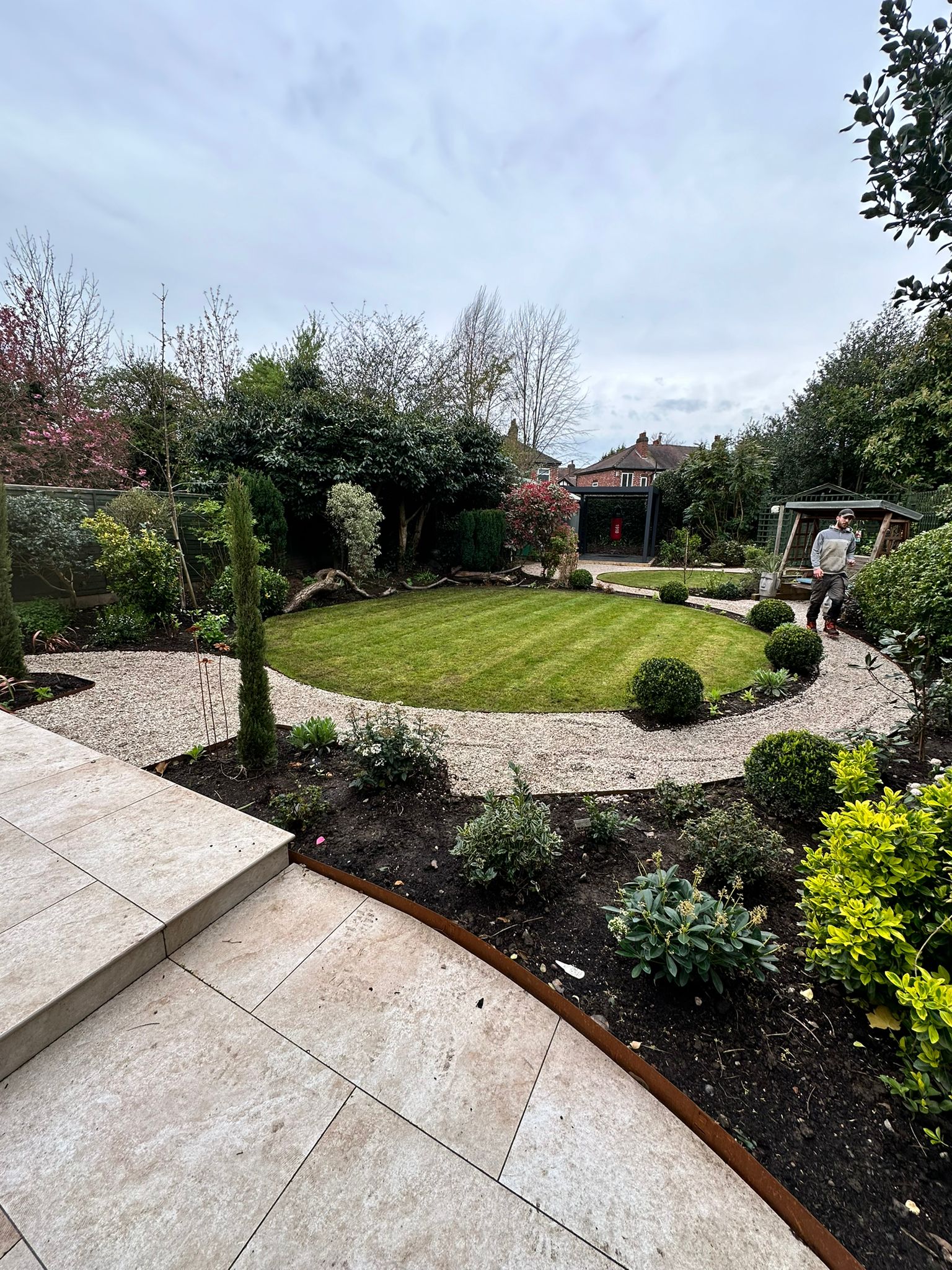
If you’re searching for “landscapers near me” in Cheshire or Trafford, consider reaching out to Master Landscapes for expert garden design and landscaping services.

